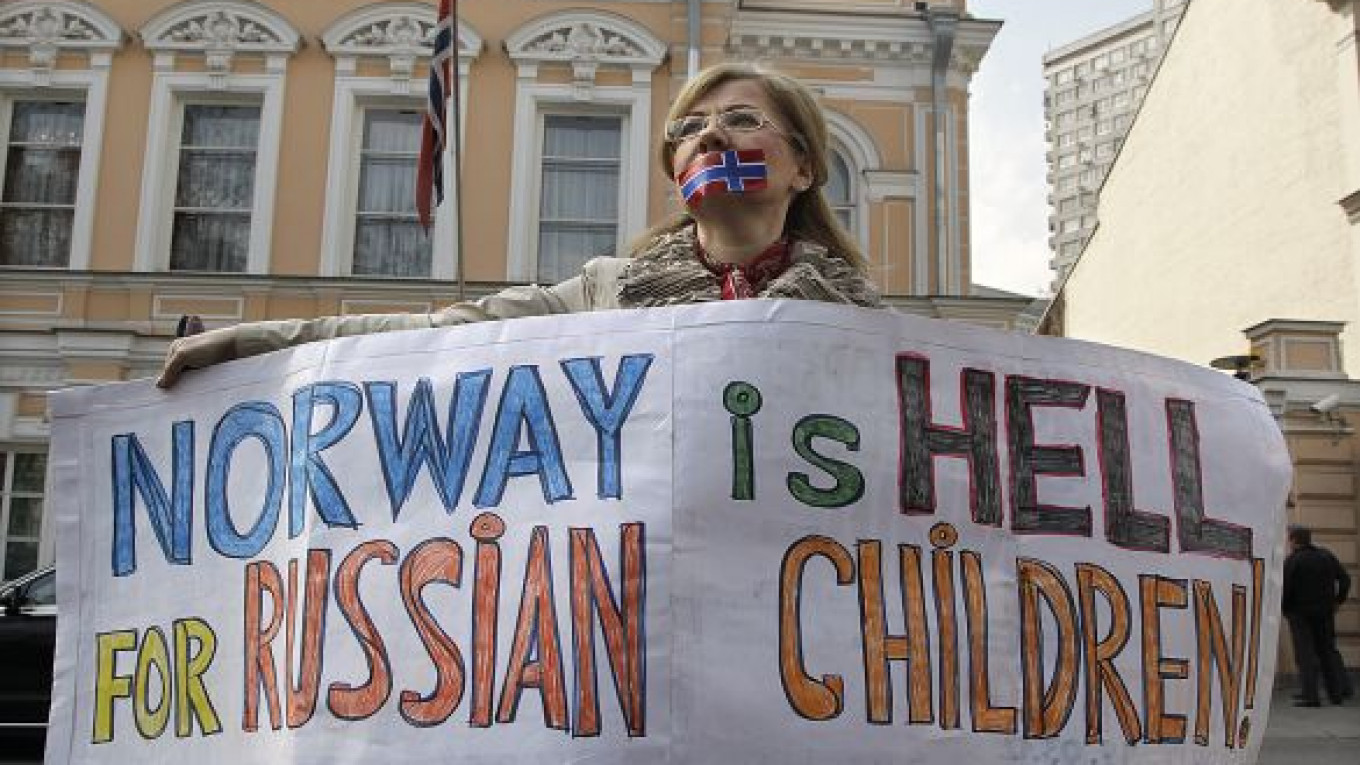Dozens of Russian parents stripped of their parental rights abroad following difficult custody battles called for help Thursday from Russia’s top children’s ombudsman.
Irina Bergseth, of the public advocacy group Russian Mothers, delivered a list at a news conference to children’s ombudsman Pavel Astakhov, naming 66 people seeking to re-establish custodial rights over their children, many of whom now live overseas.
The cases of the kids involved — who either have one Russian parent and one foreign parent or live in foreign foster homes — have been greatly complicated by the lack of bilateral agreements and the children not having Russian citizenship, Astakhov said.
The public plea for help came just two days after President Dmitry Medvedev submitted a to the State Duma that would abolish a requirement that a foreign parent give consent for a child from a mixed marriage to receive Russian citizenship.
The parents, who collectively have lost rights over 96 children living in 18 countries, began approaching Bergseth’s group for help in early January.
Irina Sidelnikova, whose 4-year-old daughter lives with her father in Britain, said law enforcement agencies there refused to consider her allegations that her former husband had sexually abused their daughter before awarding him custody.
“Unfortunately, all agencies stand up to defend their own citizens,” Sidelnikova said at the conference, which was held with participants in both Moscow and St. Petersburg joined via video link.
Astakhov, who spoke from St. Petersburg, said what has stacked the deck against Russian parents in foreign countries is the fact that Russia until recently did not consider kidnapping by a parent of their own child a criminal offense, while many European countries long have.
Russia did ratify the 1980 Hague Convention on the Civil Aspects of International Child Abduction about six months ago, which would criminalize child abduction by a parent, but Astakhov said it would take at least a year to enforce the convention’s protocols.
Several of the eight mothers present at the news conference complained that antagonism to the Russian mentality — such as excessive emotion — has led foreign authorities to often side with the foreign parent or foreign foster family.
“They take away our children and criminally prosecute us only because we react in a different way to a stress,” said Bergseth, who had custody of her 4-year-old son awarded to her former husband in Norway despite him being charged with pedophilia in Russia.
One mother, Rimma Salonen, who is fighting to win back custody of her son from a Finnish ex-husband, suggested that demographic shortfalls in Western countries might be behind their desire to take Russian children.
Of the 18 countries involved in the cases brought to the group’s attention, Finland took 44 children from 34 families and Norway 15 children from 11 families.
France removed three children from three families, Germany five children from three families and Australia four children from one family. Additionally, Cyprus took two children from two families, the Netherlands three children from two families and Italy four children from one family.
The United States, Canada, Denmark, Austria, New Zealand and Malta each removed one Russian or half-Russian child from one family each, Bergseth said by telephone after the conference.
Of the 96 children, only 14 have managed to return to Russia, but illegally, Bergseth said.
E-mails sent to UNICEF’s offices in Geneva and New York, the Council of Europe’s commissioner for human rights and child rights division, the UN Committee on the Rights of the Child and Norway’s children’s ombudsman went unanswered as of late Thursday.
A Message from The Moscow Times:
Dear readers,
We are facing unprecedented challenges. Russia's Prosecutor General's Office has designated The Moscow Times as an "undesirable" organization, criminalizing our work and putting our staff at risk of prosecution. This follows our earlier unjust labeling as a "foreign agent."
These actions are direct attempts to silence independent journalism in Russia. The authorities claim our work "discredits the decisions of the Russian leadership." We see things differently: we strive to provide accurate, unbiased reporting on Russia.
We, the journalists of The Moscow Times, refuse to be silenced. But to continue our work, we need your help.
Your support, no matter how small, makes a world of difference. If you can, please support us monthly starting from just $2. It's quick to set up, and every contribution makes a significant impact.
By supporting The Moscow Times, you're defending open, independent journalism in the face of repression. Thank you for standing with us.
Remind me later.






